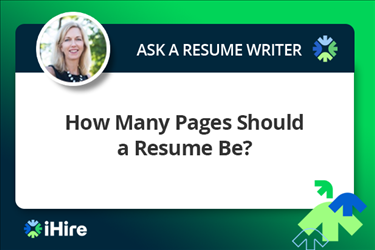- Job Seeker Resources
- |
- Last Updated: May 12, 2021

Can You Use Quotes in a Resume?
Because it’s a less common technique, using quotes on a resume is sure to make hiring managers take notice. Whether these references make a positive or negative impression, however, depends on how you implement them. Here are some tips for utilizing testimonials on a resume effectively and persuasively.
Can You Use Quotes in a Resume? It Depends.
Resume quotes directly related to your work ethic and/or skills can be a powerful tool for getting a leg up on the competition. Including such testimonials on a resume gives potential employers evidence of the value you can bring to their company. They get to hear about what it’s like to be your supervisor, coworker, or client from someone who has experienced it firsthand.
Do not use celebrity or motivational quotes. Even if it has driven or defined your career, these personal mottos do not belong in your resume. The general guideline is that if it doesn’t have anything to do with your professional abilities or successes, eliminate it. You can always mention an inspirational saying in your cover letter or during the interview if you have the opportunity.

Choosing Resume Quotes
There are a few ways to gather quotes you can use in a resume. Reference letters and previous performance reviews are great sources of the positive, supportive feedback that hiring managers like to see. If you have access to emails clients have sent you or reviews they have written, these can be highly effective as well. Quotes are most powerful when you can give the speakers’ names, but you must ask their permission to do so. If you can’t get this consent, you can identify a reviewer as “Client,” though this will reduce the quote’s impact.
You can also acquire testimonials to use on a resume by directly asking supervisors, mentors, and coworkers to provide some. The process is very similar to asking for a reference. Make sure to mention some specific assignments you worked on with this person, or recognition you received while working at that organization. You may also want to include some helpful guidelines like “Just a sentence or two about what you liked best about working with me/what I brought to the team/etc. would be really helpful.”

Arranging Quotes on Resume
One of the most difficult parts of using quotes on a resume is determining where to put them. Should quotes go in the body of your resume? In your summary paragraph? Or is it most appropriate to give testimonials their own section? Try one of these formatting strategies depending on the material available to you:
For Single Quotes: These tactics leverage the top of your resume for especially hard-hitting citations. Because this initial section—with your summary paragraph and core competencies—is so important and must remain uncluttered, these strategies should only be used with a single one- or two-line quotation, rather than multiple longer ones.
- Sub-header: An italicized, one-line quotation inserted under your prospective job title at the top of the document can serve in place of a branding statement. Avoid placing commentary about specific projects or achievements here. Instead, use this tactic when the reference sums up your career (for example, “Outstanding employee who is constantly going above and beyond”).
- Lead-In: Include a center-aligned quotation beneath your summary and core competencies to transition your reader into your professional experience or career highlights section. This strategy is most effective when the testimonial is a general statement of your work ethic or habits, as it will frame how the hiring manager perceives your work background. It is also a good strategy for slightly longer, two-line quotes.
Register with iHire. Find your dream job.
For Multiple Quotes: These techniques will give you the space you need for using multiple quotes on a resume, but be careful not to overdo it. Keep the number of testimonials under five to minimize the likelihood of potential employers skipping them altogether.
- Sidebar: A sidebar can run down the entire page, or just one section, giving you plenty of room for multiple testimonials. Clear separations are the key to using this technique effectively. Create an obvious partition with a line or by shading the strip with a light color. Also make sure that you include plenty of white space between each quote, to prevent them from running together and making your resume look messy.
- Job Testimonials: For those in customer service positions or with a track record of consistent, positive performance reviews, including one quote per previous position in your professional experience section may be an option. Simply include it as an additional entry in your bulleted list of achievements.
- Supplemental Section: Like professional affiliations, publications, and licenses, testimonials can be their own section toward the bottom of your resume. This is a good tactic when your quotes are largely reactions to, or backup for, your highly impressive achievements.
Whenever possible, include the name and title of the person you’re quoting. This both makes the testimonial look more credible, and provides some context regarding your relationship to the speaker.
Integrating meaningful testimonials into your resume can be a great way to ensure potential employers get an additional point of view regarding your achievements and professional strengths, even if they only skim through your references. To make sure your resume has what it takes to make it to the top of the recruiter’s pile, keep reading our career advice, or check out iHire’s resume writing services and let us write it for you.
Sign In or Register to access all articles and insider tips for help in your job search.
Search for Technology Jobs
RELATED JOBS
Title : DOH-IT Consultant 2(Data Engineer)766795 Location : Columbus, OH Duration : 12 + Months...
Network EngineerTittle: Network Engineer Location: Columbus, OH Responsibilities: Install, maintain, configure,...
Senior Tableau DeveloperDirect client - Tableau Developer, Columbus, OH Hybrid onsite Job Title: Tableau Developer,...
Senior Tableau Developer - Must have State of Ohio experience - HybridJob Title: Tableau Developer Description: The candidate must be a senior Tableau developer who...
Application Architect- must have ATM and branch Systems including Batch and Backend IntegrationHuntington Bank Columbus OH HYBRID- 4 days onsite each week Needed ASAP Contract to hire Must...
RELATED RESOURCES
Find the Right Job Faster
- Get personalized job matches sent to your inbox every day
- Connect directly with employers before your competition
- Advance your career with expert advice on interviewing, salary negotiation, and more
We value your privacy




